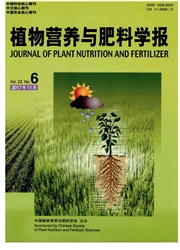

 中文摘要:
中文摘要:
氮素在作物产量和品质形成中起着关键作用。本文综述了什么是合理施氮,包括施氮量、施氮方法和时期,也包括与有机肥和秸秆还田措施的配合等。指出我国农田氮肥施用的主要问题是施肥过程和施肥后的严重损失。依据农户调查所获得的田块尺度施氮量,与田间试验合理施氮量对比分析表明,过量施氮田块占总调查田块的大约33%。依据区域尺度单位播种面积平均施氮量,与作物平均推荐施氮量对比分析表明,全国过量施氮面积占播种面积20%、合理面积占70%、不足面积占10%。总体而言,过量施氮现象还相当普遍,特别是在蔬菜和果树等经济作物上。本文提出了一种估算国家尺度氮肥需求量的方法,可估算出全国合理需氮量范围,称之为氮肥需求量估算法。用三种不同方法估算的我国1980~2010年间的氮肥需求量与实际氮肥使用量比较表明,如仍然依照现在的粗放施肥习惯,应该为现在的实际氮肥使用量,5年平均为N 27.9×106t左右,正好处于合理需氮量范围的中线。在改善施肥技术基础上,我国2006~2010年间5年氮肥平均使用量应该在N 19.6×106t左右;用五种方法预测的我国未来氮肥需求量表明,如果改善施肥技术,我国2020、2030、2050年合理氮肥需求量分别为N 21.0×106t、21.7×106t、23.1×106t;如施肥技术得不到实质性改善,依然粗放施氮,则氮肥需求量应处于合理使用量范围的中线,分别为N 30.4×106t、31.4×106t、33.4×106t。进一步分析了我国粮食产量和氮肥施用量与美国和西欧的差异,我国农田有机肥和碳投入对增加土壤有机碳氮库的重要性。
 英文摘要:
英文摘要:
Nitrogen( N) plays a key role in the formation of crop yield and quality. This paper reviews the rational N application which includes rate, time and method, and also includes combinations of manure and straw etc. It points out that the severe N loss in the applied process and after fertilization is the main problem of fertilization in Chinese cropland. Based on the farmer investigation and the rational N rate from the field experiments, the proportion of overuse N of farmers’ fields occupies about 33% of total investigated fields. However, on the basis of regional scale, comparing with average recommended N rate, the average N rate per sowing area for overuse, rational and insufficient N rate account for 20%, 70% and 10% of the total sowing area, respectively. Generally, the phenomenon of overuse is common, especially in cash crop such as vegetable and fruit tree. We further proposed a method for estimating national N fertilizer demand in this paper. By using three different kinds of estimating method and comparing with actual national total N fertilizer consumption from 1980 to 2010 , the actual total N fertilizer consumption is not excessive ( 27. 9 × 106 t N annually from 2006 to 2010 ) if extensive fertilization;but if with the improved fertilization techniques, the total N fertilizer consumption should be about 19. 6 ×106 t N annually from 2006 to 2010. Using five different kinds of predicting method shows that the national rational N demand for 2020, 2030 and 2050 is 21. 0 ×106 t N, 21. 7 ×106 t N and 23. 1 ×106t N, respectively, if we improve the fertilization technologies. On the contrast, the national rational N demand for 2020, 2030 and 2050 is 30. 4 ×106 t N, 31. 4 × 106 t N and 33. 4 × 106 t N if we still use extensive fertilization. This paper further analysis the differences among China, the US and the Western Europe on the crop production and N fertilization rate. It also further analysis the importance of manure and carbon application on enhancing soil organic carbon and N pools in Chin
 同期刊论文项目
同期刊论文项目
 同项目期刊论文
同项目期刊论文
 期刊信息
期刊信息
